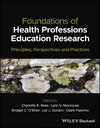Proposals in Health Professions Education Research
and Claire Palermo
Monash University, Clayton, Victoria, Australia
Search for more papers by this authorand Claire Palermo
Monash University, Clayton, Victoria, Australia
Search for more papers by this authorCharlotte Rees
The University of Newcastle, Callaghan, New South Wales, Australia
Search for more papers by this authorLynn Monrouxe
The University of Sydney, Camperdown, New South Wales, Australia
Search for more papers by this authorBridget O'Brien
University of California San Francisco, San Francisco, California, USA
Search for more papers by this authorSummary
This chapter describes the different purposes of health professions education research (HPER) proposals. It explores the key phases for drafting a high-quality HPER proposal including the key components of high-quality educational research proposals. The chapter discusses the style of writing required for HPER proposals and also explores common errors made in HPER proposals. A research proposal identifies an issue or problem, intellectual or practical, for which more information is needed. Research proposals are an essential part of the research process. The chapter draws on two case study examples to illustrate key points – an unpublished successful grant application and a published research protocol – providing critical reflection on these examples. The typical components of a research proposal are title page, abstract/summary, introduction, conceptual and theoretical frameworks, methodology and methods, educational implications, significance, and impact, dissemination plan, timeline, budget, research team and roles and responsibilities, and references.
References
- Thomas DR , Hodges ID . Designing and Managing Your Research Project: Core Knowledge for Social and Health Researchers . Thousand Oaks, Calif .: SAGE ; 2010 .
- Maxwell JA . Qualitative Research Design: An Interactive Approach , 2nd ed. Thousand Oaks, Calif .: SAGE ; 2005 .
- Hofmann A . Scientific Writing and Communication Papers, Proposals, and Presentations , 4th ed. New York : Oxford University Press ; 2019 .
- Blanco MA , Gruppen LD , Artino Jr AR , et al. How to write an educational research grant: AMEE Guide no. 101 . Med Teach . 2016 ; 38 ( 2 ): 113 – 122 .
- Porter R . Why academics have a hard time writing good grant proposals . J Res Admin . 2007 ; 38 ( 2 ): 37 – 43 .
- Wisdom J , Riley H , Myers N . Recommendations for writing successful grant proposals: an information synthesis . Acad Med . 2015 ; 90 ( 12 ): 1720 – 1725 .
- Kumar A , Sarkar M , Davis E , et al. Impact of the COVID-19 pandemic on teaching and learning in health professional education: a mixed methods study protocol . BMC Med Educ . 2021 ; 21 ( 1 ): 439 .
-
Wong G
.
Literature reviews: who is the audience?
In
J Cleland
,
S Durning
, eds.
Researching Medical Education
.
Chichester
:
Wiley Blackwell
;
2015
:
25
–
34
.
10.1002/9781118838983.ch3 Google Scholar
- Blanco MA , Lee MY . Twelve tips for writing educational research grant proposals . Med Teach . 2012 ; 34 ( 6 ): 450 – 453 .
- Lingard L . Bonfire red titles . PerspectMed Educ . 2016 ; 5 ( 3 ): 179 – 181 .
- Lingard L . Joining a conversation: the problem/gap/hook heuristic . Perspect Med Educ . 2015 ; 4 ( 5 ): 252 – 253 .
- Varpio L , Paradis E , Uijtdehaage S , et al. The distinctions between theory, theoretical framework, and conceptual framework . Acad Med . 2020 ; 95 ( 7 ): 989 – 994 .
- Bordage G , Lineberry M , Yudkowsky R . Conceptual frameworks to guide research and development (R&D) in health professions education . Acad Med . 2016 ; 91 ( 12 ): e2 .
- Ringsted C , Hodges B , Scherpbier A . ‘The research compass’: an introduction to research in medical education: AMEE Guide no. 56 . Med Teach . 2011 ; 33 ( 9 ): 695 – 709 .
- Palermo C , Reidlinger DP , Rees CE . Internal coherence matters: lessons for nutrition and dietetics research . Nutr Diet . 2021 ; 78 ( 3 ): 252 – 267 .
-
Geraldi J
,
Lechter T
.
Gantt charts revisited: a critical analysis of its roots and implications to the management of projects today
.
Int J Manag Proj Bus
.
2012
;
5
(
4
):
578
–
594
.
10.1108/17538371211268889 Google Scholar
-
Lingard L
,
Watling C
.
Story, Not Study: 30 Brief Lessons to Inspire Health Researchers as Writers
.
Cham
:
Springer
;
2021
.
10.1007/978-3-030-71363-8 Google Scholar



